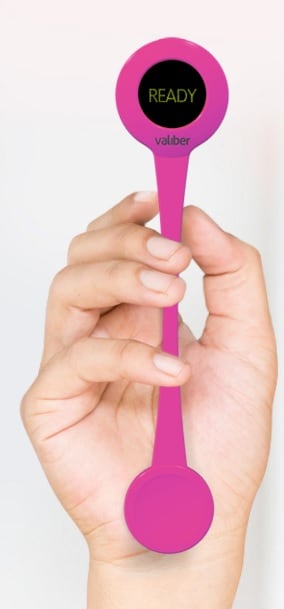Founded by entrepreneur Yuval Klein, Valiber has established a patent-pending Val Sweetness Scale, along with a tool, the Valiber Swizzle, that allows people to measure the sweetness of their drink.
In the future the technology could help create more personalized products to meet consumers’ taste preferences, or assist manufacturers in reducing sugar content while maintaining the desired taste and sweetness, says the company.
The technology
The patent pending Val Sweetness Scale has been created to measure sweetness, and indicates this through a numeric unit. The point at which sweetness is felt is the sensitivity threshold, defined as one Val. Twice the sweetness is two Val, and so on.
In the scale, 1 Val equates to 3.423g of white sugar in 1 liter of water, pH 7 at 20ºc.
The prototype of the technology, Valiber Swizzle 1.0, is a stick which can be stirred in the drink to find out how sweet it is, in Vals. Valiber is now refining the prototype into one that can be manufactured to scale, and includes additional functionality. The target date for this launch is September 2016.
In addition, a Valiber app allows people to find out the sweetness of a drink by entering its volume, sweeteners and their mass as displayed on the packaging.
Valiber has already released an online database with thousands of soft drinks and juices from more than 100 international brands, indicating their sweetness level.
But don’t labels tell you how much sugar is in a drink?

Soft drinks labels show consumers what types of sugar or sweetener are used. However, this does not tell the consumer how sweet the overall beverage is going to be. Fructose, for example is sweeter while glucose is less sweet than sugar, explains Valiber.
Coca-Cola, for instance, varies in sweetness between markets. The sweetness of a Spanish can of Coca-Cola displays a sugar content of 10.6g per 100ml, and its ‘sweetness measurement’ comes in at 35 Val, calculates Valiber. A can of Coca-Cola in Japan displays a higher sugar content of 11.3g per 100ml, yet its sweetness measurement comes in lower at 31 Val.
The first edition of Viber Swizzle only measures natural sugars, but the improved version will be able to distinguish between all sweeteners.
Personalization
So why would consumers want to measure the sweetness of a drink? Valiber told BeverageDaily that, in an era of personalization, it will let them customize their choices.
“When someone makes a drink, it will help him or her make the drink exactly the way they like it. The Val scale will also enable people to communicate their preferred sweetness with others that make drinks for them, for example bartenders, friends or family.
“When a customer buys a drink, it will give him or her an exact sense of the taste (sweetness, saltiness, etc) of the product just by looking at the label. This way, different brands can be compared in terms of taste even before buying and opening the package (without having to actually taste the product).
“In addition, brands will be able to further segment their product lines – providing additional differentiation and margins.”
However, Valiber says it sees even greater potential for the future, going beyond sweetness and looking at other tastes such as sourness or bitterness, or even alcohol content.
“On the consumer level, the Valiber Swizzle will be able to provide people with a complete “taste DNA” of everything they eat and drink; it will be able to measure sweetness, sourness, saltiness, bitterness, alcohol level, CO2, temperature, and more.
“The data shared will give us invaluable insights in people’s taste preferences. We see a future where Valiber’s technology will be embedded in kitchen appliances such as blenders and refrigerators, enabling users to create drinks exactly according to their taste.
“The massive amounts of data generated by these items about customer tastes and preferences will create the world’s first global database of customer tastes. On this basis, companies will revolutionize product formulation."
Valiber says its technology will enable manufacturers to create more personalized products in accordance with their customers’ taste preferences.
“Most importantly, this can be a healthier future wherein manufacturers can reduce the amounts of sugars that they add to their products, while maintaining the “taste” or sweetness level that their customers desire.
“The new information that the Val scale brings will change the way we look at products completely; allowing industries to replace ingredients with healthier substitutes while maintaining taste quality.”
